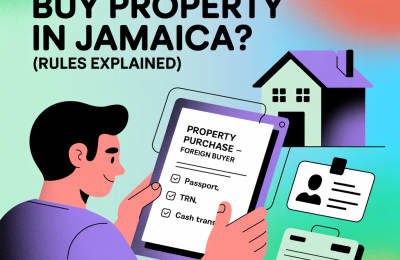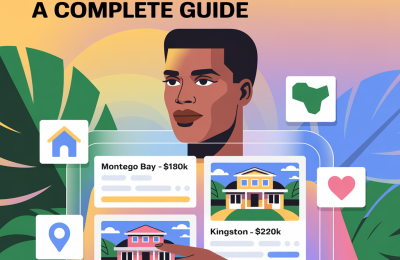Buying Your First Home in Jamaica? Read This Before You Start
Buying your first home in Jamaica isn’t just a transaction, it’s a life-changing moment. Whether you're returning from overseas, starting fresh, or finally planting roots, navigating Jamaica’s real estate market can feel overwhelming if you don’t know where to begin. That’s why we’ve built this guide: a clear, practical roadmap that breaks down every step, from getting your finances in order to closing the deal and securing your keys. If you’re serious about becoming a homeowner in Jamaica, read this before you make a move.
Assess Your Financial Readiness
Review Your Finances
Start with a hard look at your money. How much do you earn monthly? What are your fixed expenses? What’s left to save or put toward a mortgage? Understanding your financial bandwidth helps you set a realistic budget and avoid the heartbreak of falling for a home you can’t afford.
Save for a Deposit
In Jamaica, most lenders expect a down payment of 10–20% of the property’s price. If you’re an NHT contributor, you might qualify for options that require as little as 5%. The earlier you start saving, the more flexibility you’ll have when it’s time to make an offer.
Prepare for Closing Costs
Don’t get blindsided by the extra costs. Legal fees, transfer taxes, stamp duty, valuation reports, and surveyor's fees can add up to an additional 4–6% of the purchase price. It’s smart to budget for these from the outset so you’re not scrambling when the sale agreement is signed.
Get Pre-Approved for a Mortgage
Shop Around
Before committing to any one lender, compare what’s out there. Jamaica’s mortgage market includes options from the National Housing Trust (NHT), commercial banks like JN Bank or Scotiabank, and building societies such as VMBS. NHT offers the lowest rates (often 0–5%), while commercial lenders typically range from 7.95% to 11.5%. Compare interest rates, repayment periods, and flexibility. Don’t settle for the first offer, treat it like you’re shopping for your most important investment.
Pre-Approval Process
A mortgage pre-approval doesn’t lock you into a loan, but it tells sellers and agents you’re serious. To get pre-approved, you’ll need documents like proof of income, job letters, TRN, and a solid record of savings. Your lender will evaluate your debt-to-income ratio and assess how much they’re willing to lend. Pre-approval gives you a clear price range and strengthens your negotiating power when you find a home you love.
Check Your Credit
Your credit profile plays a critical role in your loan approval. Before applying, pull your credit report and ensure it’s accurate. Pay off high interest debt, avoid late payments, and hold off on new loans or credit cards. A strong credit record, especially in the six months before applying, can mean better rates and faster approval.
Find a Licensed Real Estate Agent
Choose Wisely
Not all agents are equal. Look for someone licensed by the Real Estate Board of Jamaica and experienced in the area you’re targeting. Interview a few agents, check reviews, and don’t be afraid to ask tough questions. A good agent isn’t just a tour guide, they’re your advocate in a high-stakes game.
Benefits of Working with a Pro
A licensed real estate agent simplifies your journey. They know the neighborhoods, pricing trends, and red flags to watch for. From arranging viewings and writing offers to navigating the legal process, a trusted agent saves you time, reduces risk, and helps you avoid costly mistakes. Think of them as your guide, negotiator, and safety net, all in one.
Start Your House Hunt
Research Listings
Begin by browsing reputable real estate platforms like Realtor.com, Yaadroom.com, or VLAREALTORS. These sites give you a sense of current pricing, neighborhood options, and what’s available in your price range. Don’t ignore smaller local agencies either, they often have hidden gems that aren’t posted on the big sites.
Consider Key Factors
Look beyond square footage and aesthetics. Think about commute times, school zones, nearby amenities, and the overall safety and reputation of the neighborhood. Is the area prone to flooding? Is it developing or declining? Is the infrastructure solid? These long-term factors matter more than curb appeal when buying your first home.
View Properties
Photos don’t tell the full story. Schedule in-person or virtual tours and walk through the property with a critical eye. Check for cracks, leaks, faulty wiring, and signs of neglect. Ask the agent about the property’s history, the reason for sale, and any pending developments in the area. Bring a checklist, and don’t be shy about taking notes.
Make an Offer and Negotiate
Offer Process
Found “the one”? Your real estate agent will help you draft an offer based on current market conditions and recent comparable sales in the area. You’ll typically need to submit your pre-approval letter along with the offer. This tells the seller you’re financially ready and serious.
Negotiation Tactics
Don’t lowball just to test the waters, that can backfire. Instead, negotiate smartly. You can request repairs, closing cost contributions, or a flexible move-in date. If the seller receives multiple offers, being pre-approved and professionally represented could be what seals the deal.
Sale Agreement Details
Once an offer is accepted, both parties sign a Sale Agreement. This legally binding document outlines the final price, payment terms, deposit (usually 5–20%), and the expected timeline for closing. It’s drafted by an attorney and should be reviewed carefully. This is where things get official, so ask questions and clarify everything.
Conduct Due Diligence
Legal Checks
This is where your attorney earns their keep. They’ll conduct a title search to confirm legal ownership, check for any liens or disputes, and verify the boundaries of the property. If there’s a right of way, covenant, or squatter issue, it should be discovered here. Never skip this step. A clean title is non-negotiable.
Valuation and Surveyor’s Reports
Lenders typically require a valuation report to confirm the property’s market value. You’ll also need a surveyor’s ID report to ensure the physical boundaries match what’s on record. These reports protect you from overpaying, or worse, buying land that doesn’t legally belong to the seller.
Required Documentation
You’ll need your Tax Registration Number (TRN), government-issued ID, proof of address, and sometimes job letters or bank statements. If you’re applying for an NHT loan or joint mortgage, ensure all co-applicants have their documents in order too. This paperwork is your passport to the purchase.
Finalize the Purchase
Secure Financing
With the Sale Agreement in hand, you’ll submit your mortgage application. Your lender may ask for updated documents, so be ready. Once approved, they’ll disburse funds directly to the seller’s attorney, less your deposit. Keep communication open and respond quickly to avoid delays.
Pay Taxes and Fees
Jamaican property purchases come with several mandatory costs:
- Stamp Duty: Shared equally between buyer and seller.
- Transfer Tax: Paid by the seller, but sometimes negotiated.
- Registration Fees: Typically borne by the buyer.
Add legal fees, valuation charges, and other professional services to the mix, and you’re looking at 4–6% of the sale price in closing costs.
Close the Deal
Once all conditions are met, it’s time to sign final documents. You’ll pay the remaining balance, and the attorney will begin the title transfer process. Congratulations, once this is done, you officially own the property!
Register and Insure Your Property
Property Registration
Your attorney will submit the necessary documents to the National Land Agency (NLA) to have the title transferred into your name. This process ensures the government officially recognizes you as the legal owner. Without this step, your purchase isn’t truly complete.
Insurance Coverage
Protect your investment immediately. Homeowners insurance in Jamaica covers risks like fire, flood, hurricane damage, and theft. Most lenders won’t release full mortgage funds without it. Even if you’re buying with cash, insuring your new home is just smart protection.
Know Your Rights and Responsibilities
Legal Protections
As a homeowner in Jamaica, your rights are protected by several key laws, including the Registration of Titles Act, the Real Estate (Dealers and Developers) Act, and the Constitution of Jamaica. These ensure your property can’t be arbitrarily taken, encroached upon, or misused by others. A properly registered title gives you full legal ownership, this is why due diligence and registration are non-negotiable.
Ongoing Responsibilities as a Homeowner
Ownership comes with obligations. You must:
- Pay annual property taxes to the local government.
- Maintain the property in accordance with zoning and building regulations.
- Honor covenants or restrictions attached to the land title.
- Stay compliant with housing laws, especially if you rent out the property.
Neglecting these responsibilities can lead to fines, legal action, or depreciation of your asset.
Useful Resources
Here are essential links to official sites that offer support, tools, and guidance throughout the home-buying process:
- Jamaica Real Estate Board – Verify agent licenses, read laws, and stay informed about regulatory changes.
- National Housing Trust (NHT) – Explore affordable mortgage options, contribution requirements, and special programs for first-time buyers.
- National Land Agency (NLA) – Handle land titles, boundary issues, and official land records.
- Jamaica Bar Association – Find qualified attorneys and understand legal rights related to property.
- Realtors Association of Jamaica – Connect with trusted real estate professionals and browse listings.
Key Tips for First-Time Buyers
Be Patient
The process takes time, rushing can lead to costly errors. Do your research, ask questions, and wait for the right property.
Budget for Hidden Costs
It’s not just the sticker price. Legal fees, taxes, insurance, and maintenance add up. Build in a buffer of at least 10 - 15% above your purchase budget.
Seek Professional Advice
Your attorney and real estate agent are your frontline defense against bad deals and legal issues. Use them.
Stay Informed
Laws, mortgage rates, and property trends can shift quickly. Subscribe to local real estate blogs, follow trusted agents on social media, and check lender updates regularly.
Final Thoughts
Buying your first home in Jamaica is a major achievement, and with the right preparation, it can be a smooth, rewarding experience. From securing your finances and choosing the right professionals to understanding your legal rights, every step you take brings you closer to owning a piece of paradise.
Remember: patience, due diligence, and expert advice are your best tools. Stay informed, plan carefully, and trust the process.
When you're ready to start your search, make it easier with Yaadroom.com, your trusted platform for finding homes across Jamaica. Browse verified listings, connect with experienced agents, and take the first step toward owning your dream home today.
News insight
 Jan 05, 2026
Jan 05, 2026
Can Foreigners Buy Property in Jamaica? (Rules Explained)
Can foreigners buy property in Jamaica? Learn the rules, legal process, taxes, and costs for non-res...
 Feb 12, 2025
Feb 12, 2025
How to Find Properties for Sale in Jamaica: A Complete Guide
Looking to buy property in Jamaica? This guide explores the best ways to find homes, land, and comme...
 Feb 11, 2025
Feb 11, 2025
Dreaming of a Home in Jamaica? Here’s What You Can Afford
Wondering what you can afford in Jamaica’s 2025 housing market? Explore price ranges, tips, and reso...

